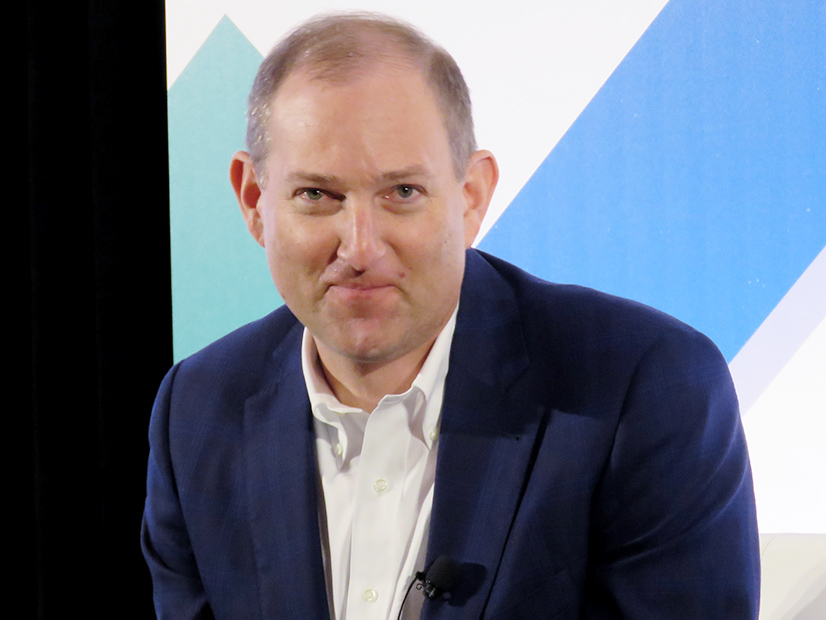MCLEAN, Va. — A growing economy driven by new data centers has demand surging in Dominion Energy’s utility territory, CEO Robert Blue said in a speech Sept. 20.
“Demand for electricity is growing at levels not seen since the years following World War II,” Blue said. “We hit new summer demand peaks in each of the past four years. This year, we’ve had not just one peak, but a whole series of them. In fact, seven out of the 10 highest system peaks that Dominion Energy has ever seen took place in a single two-week period this summer.”
That was in line with Dominion’s forecast, and there is no sign of it stopping anytime soon, Blue said at a luncheon hosted by bipartisan business group Virginia FREE.
PJM expects demand in Dominion’s territory to rise by 85% over the next 15 years, which is far more than it had to deal with in the previous 15, Blue said. That is going to have impacts on reliability, affordability and the transition to cleaner energy, he said.
The utility needs to maintain resource adequacy not just for its residential customers, but for large government and business customers in the D.C. area.
“Some of the entities we serve include the Pentagon, the CIA, the NSA and seven FBI field offices,” Blue said. “As many of you know, around two-thirds of the world’s internet traffic passes through Northern Virginia, so it’s no exaggeration to say [that] if we don’t execute on our mission, people around the country and even around the globe can’t execute on theirs.”
Blue said Virginia’s policies have prepared the firm to handle continued growth by allowing it to build several new natural gas plants around the state in recent years, but given how much demand is growing, it will need more supply.
“We’re going to have to add more generation and more transmission, and we won’t be able to match rising customer needs with renewable generation alone,” Blue said. “Now understand, we’re adding renewable resources at a rapid pace … but we’re also going to need other forms of generation to step in when the weather doesn’t cooperate, as well as during periods of high demand, such as cold snaps and heat waves.”
That includes building more natural gas plants, preserving Dominion’s existing nuclear capacity and perhaps building new nuclear resources as well. (See Dominion Issues RFP for Small Modular Reactor at North Anna.)
The Virginia Clean Economy Act requires carbon neutrality by 2045; Blue said Dominion has already cut its emissions in half since the early 2000s, as it has replaced coal plants with natural gas. The former’s share of the company’s generation mix has plummeted from over half in 2005 to about 10%.
“That’s had a substantial impact on our emissions profile,” Blue said. “It’s also given us the confidence to layer in more renewables, knowing that when the weather isn’t cooperating, gas-fired generation can step in and support our customers.”
A decade ago, Dominion had no solar; now it has one of the largest portfolios of any utility. And the Coastal Virginia Offshore Wind Project is moving ahead on budget with construction on schedule, even as offshore wind in the Northeast has run into many issues.
“One big reason we’ve succeeded where others haven’t is Virginia’s regulated utility model, which requires us to demonstrate prudency before we can move forward with the project,” Blue said. “Indeed, I would say ‘prudency’ is the defining characteristic of Virginia’s regulatory compact, and that distinguishes our state from others that have recklessly deregulated their electricity markets.”
Blue said utility rates are higher in deregulated states, and unscrupulous retailers use deceptive and high-pressure marketing techniques on vulnerable consumers. The winter storm of February 2021 wreaked havoc in Texas — a state often held up as the model for restructuring retail power markets, he added.
Virginia is not the only traditionally regulated state in PJM, but it is part of a minority, as states like Pennsylvania, New Jersey and Maryland have all opened up their retail markets to competition and given up some authority over generation in the process.
In 2020, Virginia imported 18% of its power from other states in PJM, but with the surge in demand, that figure is up to 37% so far this year, Virginia Department of Energy Director Glenn Davis said in remarks later during the event.
Davis said Virginia Gov. Glenn Youngkin (R) has endorsed an “all-of-the-above” energy policy that includes all traditional forms of energy, as well as new, cleaner ones. One of the administration’s goals is to ensure Virginia has enough power that it does not need to rely on imports from other states, he said.
Imported power “has helped us meet our short-term demand because of our growing economy; it also gives us some serious long-term concerns,” Davis said. “Relying on imported power from PJM means that decisions made by states outside of Virginia — by the other 12 PJM states — have a direct impact on the reliability and cost of the energy supply.”
Dominion gets several benefits from being in PJM, especially with its long-term, cost-effective regional transmission planning that helps it meet load growth, spokesperson Aaron Ruby said. PJM’s wholesale power markets also ensure the lowest-cost power is available for its customers every day.
“With that said, we agree we don’t want to be over reliant on out-of-state power, which is why we believe in the regulated model,” Ruby said. “It gives Virginia utilities and our customers more control over our own power supply, which is the best way to ensure our power remains reliable, affordable and increasingly clean.”




